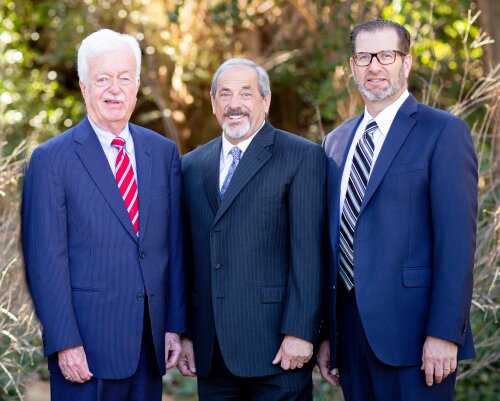Best Criminal Defense Lawyers in California
Share your needs with us, get contacted by law firms.
Free. Takes 2 min.
Or refine your search by selecting a city:
List of the best lawyers in California, United States
United States Criminal Defense Legal Questions answered by Lawyers
Browse our 1 legal question about Criminal Defense in United States and read the lawyer answers, or ask your own questions for free.
- Do you prosecute local Philippina for violating ESTAFA laws
- I was scammed by a lady presenting herself as my girlfriend.
-
Lawyer answer by mohammad mehdi ghanbari
HelloBased on the laws of the Philippines, you can file a criminal complaint against the person who scammed you for violating the laws on Estafa (swindling). Estafa is a criminal offense that involves defrauding another person of money or property...
Read full answer
United States Criminal Defense Legal Articles
Browse our 3 legal articles about Criminal Defense in United States written by expert lawyers.
- Clearing Your Record in Texas: 2026 Expunction Rules for US
- Criminal defense in the United States protects your rights from the moment of investigation through trial, sentencing, and appeals, and the stakes can include jail, fines, immigration consequences, and your future job prospects. You always have key constitutional rights: to remain silent, to have a lawyer, to be free from... Read more →
- Texas DWI Laws 2026 First Offense Penalties
- If you are arrested in the United States, you have the right to remain silent, the right to a lawyer, and the right to a fair trial - use those rights from the start. Criminal cases move quickly at the beginning: after arrest come booking, bail, your first court appearance,... Read more →
- Texas Bail Reform 2026: Why Bonds Are Harder to Secure in US
- If your loved one has just been arrested, move fast: confirm the exact charges, find out the bond amount, and contact a criminal defense lawyer immediately. In the United States, you have core rights at every stage - to remain silent, to an attorney, to reasonable bail (subject to exceptions),... Read more →
About Criminal Defense Law in California, United States
Criminal defense law in California is designed to protect individuals who have been accused of committing crimes. It encompasses a broad range of offenses, from minor infractions to serious felonies. The goal of criminal defense is to ensure that every accused person receives a fair trial and that their constitutional rights are protected throughout the legal process. California has its own set of criminal statutes, procedures, and penalties that govern how cases are handled in state courts, separate from federal laws and rules.
Why You May Need a Lawyer
If you are facing criminal charges in California, hiring a defense attorney can be crucial for several reasons. Even minor offenses can have significant long-term consequences, such as fines, jail time, probation, loss of employment opportunities, and negative effects on immigration status. A lawyer can help in situations such as being investigated by law enforcement, receiving a notice to appear in court, being arrested, or having a loved one detained. Legal representation ensures your rights are safeguarded and provides you with guidance, advocacy, and access to potential defenses that can result in reduced charges, case dismissal, or acquittal.
Local Laws Overview
California's criminal laws are primarily found in the California Penal Code and related statutes. The state categorizes offenses as infractions, misdemeanors, or felonies, each with different procedures and possible punishments. California also has specific laws regarding sentencing (such as the "Three Strikes Law"), bail, plea bargains, and alternative sentencing options like diversion programs for certain offenses. The state has strong protections for the rights of the accused, including the right to remain silent, the right to counsel, and protection against unlawful searches and seizures. Local county rules may also affect how cases proceed at the courtroom level.
Frequently Asked Questions
What should I do if I am arrested in California?
If you are arrested, remain calm and exercise your right to remain silent. Do not answer questions or make statements to law enforcement without a lawyer present. Request to speak with an attorney as soon as possible.
What are my rights during a police investigation?
You have the right to remain silent, the right to refuse consent to searches, and the right to an attorney. You should clearly inform the officers that you wish to exercise these rights.
What is the difference between a misdemeanor and a felony?
Misdemeanors are less serious crimes, usually punishable by up to one year in county jail. Felonies are more serious and can result in longer prison sentences, larger fines, and more severe consequences.
Can I get my criminal record cleared in California?
Certain offenses may be eligible for expungement or other forms of relief under California law. Eligibility depends on the nature of the offense and your specific circumstances.
What is plea bargaining in California criminal cases?
Plea bargaining is a process where the defense and prosecution negotiate an agreement, often resulting in the defendant pleading guilty to a lesser charge or receiving a reduced sentence in exchange for resolving the case without trial.
How does bail work in California?
Bail is a financial guarantee to ensure the accused appears in court. The amount depends on the severity of the offense and other factors. In some cases, individuals may be released without bail on their own recognizance, especially for non-violent or low-level offenses.
What should I expect during my first court appearance?
The first appearance, called an arraignment, is where you are formally notified of the charges against you and enter a plea. Bail may also be considered during this hearing. Having an attorney present is highly recommended.
Can I represent myself in a criminal case?
You have the right to represent yourself, but criminal defense law is complex. Without legal expertise, you may miss important defenses or procedural issues that could affect the outcome of your case.
How are juveniles treated differently in California's criminal system?
Juvenile offenders are typically handled in the juvenile justice system, which focuses on rehabilitation over punishment. The consequences and procedures are different from those in the adult system, but some serious cases may result in minors being tried as adults.
What happens if I am not a US citizen and am charged with a crime in California?
Criminal charges can have serious immigration consequences, including deportation. It is critical to have a defense attorney with experience in both criminal and immigration law to protect your status and explore all possible defenses.
Additional Resources
- California Courts Self-Help Center - California Public Defender Association - Local County Public Defender Offices - State Bar of California - California Department of Justice Criminal Law Division - National Association of Criminal Defense Lawyers - Community legal aid organizations offering criminal defense assistance
Next Steps
If you are facing criminal charges or are under investigation in California, it is important to act quickly. First, do not make any statements to law enforcement. Gather any documents related to your case and seek legal counsel immediately. Research qualified criminal defense attorneys in your area, checking their experience, client reviews, and track record. Public defenders are also available if you cannot afford a private attorney. Prepare a list of questions for your lawyer and provide all relevant information to help with your defense. Early legal intervention can make a significant difference in the outcome of your case.
Lawzana helps you find the best lawyers and law firms in California through a curated and pre-screened list of qualified legal professionals. Our platform offers rankings and detailed profiles of attorneys and law firms, allowing you to compare based on practice areas, including Criminal Defense, experience, and client feedback.
Each profile includes a description of the firm's areas of practice, client reviews, team members and partners, year of establishment, spoken languages, office locations, contact information, social media presence, and any published articles or resources. Most firms on our platform speak English and are experienced in both local and international legal matters.
Get a quote from top-rated law firms in California, United States — quickly, securely, and without unnecessary hassle.
Disclaimer:
The information provided on this page is for general informational purposes only and does not constitute legal advice. While we strive to ensure the accuracy and relevance of the content, legal information may change over time, and interpretations of the law can vary. You should always consult with a qualified legal professional for advice specific to your situation.
We disclaim all liability for actions taken or not taken based on the content of this page. If you believe any information is incorrect or outdated, please contact us, and we will review and update it where appropriate.
Browse criminal defense law firms by service in California, United States
California, United States Attorneys in related practice areas.
Browse criminal defense law firms by city in California
Refine your search by selecting a city.















